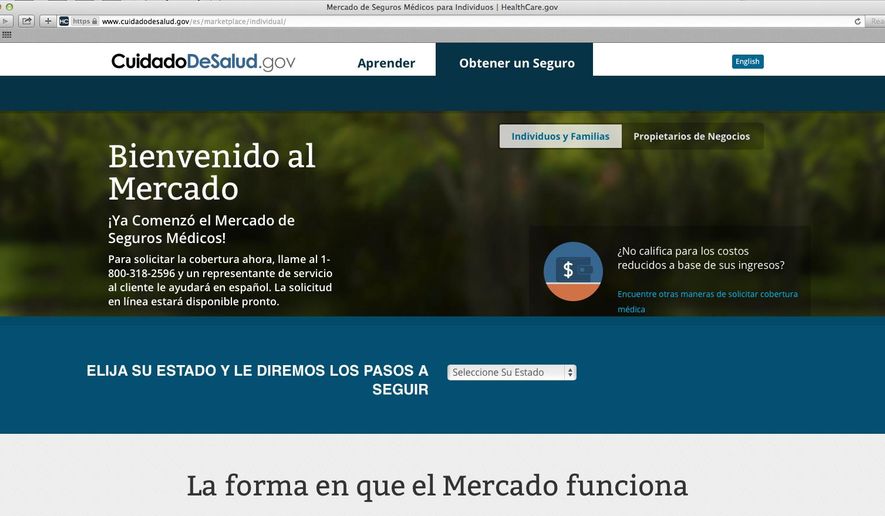A map in Angela Franco’s office highlights the D.C. streets most likely to have Hispanic business owners, and it serves as a blueprint for foot soldiers who have been pounding the pavement to get people covered through the city’s Obamacare exchange.
“We just go literally door to door,” said Ms. Franco, president and CEO of the Greater Washington Hispanic Chamber of Commerce.
Much of the success or failure of President Obama’s health care law hinges on Hispanics, who account for about a quarter of the uninsured who are eligible for coverage under the Affordable Care Act.
Yet Hispanic enrollment fell short of goals during the first round of enrollment, held back by technical glitches and a two-month delay to the Spanish-language version of HealthCare.gov, and by fears that Hispanics’ immigrant relatives would be deported if household information was divulged to the federal government.
“It’s fair to say all populations were a priority” this year, said Elizabeth Carpenter, a director at Avalere Health, a Washington-based consultancy. “I think looking at 2015, there will be increased attention on the Latino and Hispanic population.”
Enroll America, a nonprofit devoted to making coverage accessible through the Affordable Care Act, has been targeting back-to-school shoppers and school orientation sessions to let Hispanics know about their options, said Jose Plaza, national director of Hispanic engagement.
SEE ALSO: Obamacare contracts soar past estimates, audit finds
Casa de Maryland will set up computer labs this fall to let Spanish-speaking residents fill out applications for coverage on the Maryland health care exchange before they get help from bilingual navigators. The group’s new model should let advocates help more people during a 2015 enrollment season that is two months shorter than the health care act’s inaugural season.
Advocates nationwide say face-to-face help for Spanish-speaking Americans is the most effective tool they have.
“That’s what we’ve heard from our community partners. There’s a sense of reassurance and trust that people have when they’re able to sit down and talk through what questions they might have,” said Steven Lopez, a health care policy specialist for the National Council of La Raza, an umbrella group for Hispanic advocacy organizations.
Trust is paramount because many Hispanic-Americans live in families with relatives who are in the country illegally and are afraid of revealing their relatives to the federal government, despite Mr. Obama’s personal assurance that information provided for health care coverage would not be used for deportation.
“The message is coming through, but there’s still going to be doubts for even the most educated person on this topic,” said George Escobar, director of health and human services for Casa de Maryland.
Challenges remain, particularly in Texas and Florida, where Republican leaders have refused to expand Medicaid under Obamacare. That has kept government coverage out reach for roughly 800,000 Hispanics who otherwise would qualify, advocates say.
SEE ALSO: Coburn: Did feds illegally skirt Obamacare employer mandate?
Obamacare advocates say that kind of opposition creates an outsized burden on the state’s Hispanic population.
“This is not anything new for Texas,” said Ramiro Cavazos, president and CEO of the San Antonio Hispanic Chamber of Commerce. “For many, many years, the Hispanic community has arguably been disconnected from access to health care benefits and the traditional health systems that other states, especially in the Northeast, have really depended upon.”
• Tom Howell Jr. can be reached at thowell@washingtontimes.com.




Please read our comment policy before commenting.